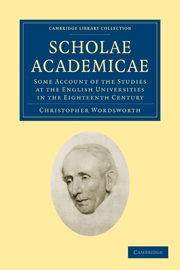 Scholae Academicae
Scholae Academicae Book contents
- Frontmatter
- PREFACE
- Contents
- CHAPTER I GENERAL INTRODUCTION
- CHAPTER II THE TRIPOS, name and thing
- CHAPTER III THE SOPHS' SCHOOLS before 1765
- CHAPTER IV ACTS AND OPPONENCIES after 1772
- CHAPTER V THE SENATE-HOUSE
- CHAPTER VI THE ADMISSION OF QUESTIONISTS. Huddling
- CHAPTER VII THE MATHEMATICKS
- CHAPTER VIII THE TRIVIAL ARTS
- CHAPTER IX HUMANITY
- CHAPTER X MORALS AND CASUISTRY
- CHAPTER XI LAW
- CHAPTER XII MODERN STUDIES
- CHAPTER XIII ORIENTAL STUDIES
- CHAPTER XIV PHYSICK
- CHAPTER XV ANATOMY
- CHAPTER XVI CHEMISTRY
- CHAPTER XVII GEOLOGY AND MINERALOGY
- CHAPTER XVIII BOTANY
- CHAPTER XIX The Degree of M.A.
- CHAPTER XX MUSICK
- CHAPTER XXI ASTRONOMY
- CHAPTER XXII CONCLUSION
- APPENDICES
- INDEX
CHAPTER XIII - ORIENTAL STUDIES
Published online by Cambridge University Press: 07 September 2010
- Frontmatter
- PREFACE
- Contents
- CHAPTER I GENERAL INTRODUCTION
- CHAPTER II THE TRIPOS, name and thing
- CHAPTER III THE SOPHS' SCHOOLS before 1765
- CHAPTER IV ACTS AND OPPONENCIES after 1772
- CHAPTER V THE SENATE-HOUSE
- CHAPTER VI THE ADMISSION OF QUESTIONISTS. Huddling
- CHAPTER VII THE MATHEMATICKS
- CHAPTER VIII THE TRIVIAL ARTS
- CHAPTER IX HUMANITY
- CHAPTER X MORALS AND CASUISTRY
- CHAPTER XI LAW
- CHAPTER XII MODERN STUDIES
- CHAPTER XIII ORIENTAL STUDIES
- CHAPTER XIV PHYSICK
- CHAPTER XV ANATOMY
- CHAPTER XVI CHEMISTRY
- CHAPTER XVII GEOLOGY AND MINERALOGY
- CHAPTER XVIII BOTANY
- CHAPTER XIX The Degree of M.A.
- CHAPTER XX MUSICK
- CHAPTER XXI ASTRONOMY
- CHAPTER XXII CONCLUSION
- APPENDICES
- INDEX
Summary
Arabicae linguae professor eras ibit in desertum.
Edm. Castell (1669).At this point some information relative to the study of the arch-science Divinity might have been expected to follow our account of Humanity and Morality.
This, however, has been postponed for another occasion, if it shall ever arise, when it is proposed to put together some collections on the kindred topic of Religious Life at the English Universities in the Eighteenth Century.
Nevertheless we here subjoin a few notes upon the study not of arabic only but of hebrew, as that may be considered simply as a branch of philology, though its literature is theological.
Some additional information, kindly communicated by Mr Bensly, will be found in the concluding chapter of this volume.
In the seventeenth century our English schools and universities were by no means behindhand in the study of hebrew. It was well done that the drudgery of learning the alphabet and grammar should be got over while the memory was young: and some traces of that system still linger at King's College Camb., and, if not now at Westminster, at the other London schools, and at King Edward VIth's school; Bury St Edmunds.
There were even among the juniors at Cambridge in 1654, many (as Barrow quaintly said) who could have understood Adam when he gave names to all things.
- Type
- Chapter
- Information
- Scholae AcademicaeSome Account of the Studies at the English Universities in the Eighteenth Century, pp. 162 - 170Publisher: Cambridge University PressPrint publication year: 2009First published in: 1877


